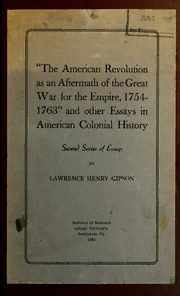
The American Revolution as an aftermath of the great war for the Empire, 1754-1763 : and other essays in American colonial history. Second series of essays PDF
Preview The American Revolution as an aftermath of the great war for the Empire, 1754-1763 : and other essays in American colonial history. Second series of essays
JUN7 KM^^ e ij^tie^fics5i=5v. 'The American Revolution as an Aftermath of the Great War for the Empire, 1754- 1763" and other Essays in American Colonial History Secona Series of Ossays BY LAWRENCE HENRY GIPSON Institute of Research Lehigh University- Bethlehem, Pa. 1950 UNIVERSITY OF PITTSBURGH LIBRARY -I OF.it>> THIS BOOK PRESENTED BY Mrs, Howard N. Eavenson : Table of Contents In 1942 there was issued by the Department of History and Government of Lehigh University ''Some Reflections upon the American Revolution" and other Essays inAmer- ican Colonial History by Lawrence Henry Gipson. The re- sponse to this on the part of students of history was such that ithasseemed desirable to place togetheranothergroup of essays that have appeared since this date and to issue them in the same manner, but now under the sponsorship of the Institute of Research. The following essays have been included 1. "The American Revolution as an Aftermath of the Great War for the Empire, 1754-1763," The Political Science Quarterly, March, 1950. 2. ''Thomas Hutchinson and the Framing of the Albany Plan of Union, 1754," The Pennsylvania Magazine of History and Biography, January, 1950. 3. "British Diplomacy in the Light of Anglo-Spanish New World Issues, 1750-1757," The American Histori- calReview, July, 1946. 4. "A French Project of Victory Short of a Declaration of War, 1755," The Ccunadian Historical Review, De- cember, 1945. 5. "The Art of Preserving an Empire," The William amd Mary Quarterly, October, 1945. 6. "British Imperialism and the Conception of Trustee- ship," The American Oxonian, January, 1947. THE AMERICAN REVOLUTION AS AN AFTERMATH OF THE GREAT WAR FOR THE EMPIRE, 1754-1763 LAWRENCE HENRY GIPSON REPRINTED FROM POLITICAL SCIENCE QUARTERLY- Vol. LXV, No. 1, March 1950 V,;.': NEW YORK PUBLISHED BY THE ACADEMY OF POLITICAL SCIENCE 1950 THE AMERICAN REVOLUTION AS AN AFTERMATH OF THE GREAT WAR FOR THE EMPIRE, 1754-1763 GREAT wars in modern times kave too frequently been the breeders of revolution. The exhausting armed struggles in which France became engaged in the latter half of the eighteenth century led as directly to the French Revolution as did the First World War to the Russian Revolu- tion; it may be said as truly that the American Revolution was an aftermath of the Anglo-French confUct in the New World carried on between 1754 and 1763. This is by no means to deny that other factors were involved in the launching of these revolutionary movements. Before proceeding with an analysis of the theme of this paper, however, it would be well to consider the wording of thetitle given toit.* Words may be used either to disguise or to distort facts as well is to clarify them, but the chief task of the historian is to illuminate the past. He is faced, therefore, with the responsi- bility of vsing only such words as will achieve this broad ob- jective of his calling and to reject those that obscure or defeat it. For this reason "the French and Indian War", as a term descriptive of the conflict to which we have just referred, has been avoided in this essay as well as in the writer's series on the British Empire before the American Revolution. This has been done in spite of the fact that it has been employed by most Americans ever since the early days of our Republic and there- fore has the sanction of long usage as well as the sanction of American national tradition assigning, as does the latter, to the Revolutionary War a position of such commanding importance as to make all other events in American history, preceding as well as followingit, quite subordinate to it. In contrast to this traditional interpretation of our history one may aflSrm that the Anglo-French conflict settled nothing less than the incom- *This paper was read before the colonial history section of the American His- torical Association in December 1948 at the Annual Meeting held inWashington.
